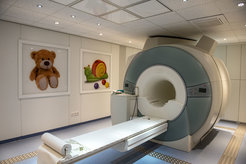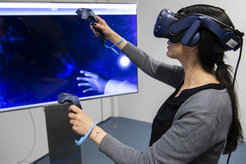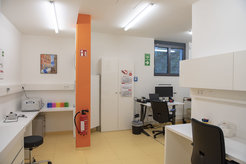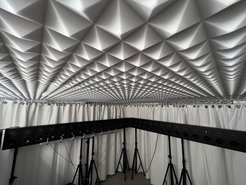Laboratories
Science is dynamic and constantly changing. The MPDCC takes these developments into account by thinking about the laboratories of tomorrow today. In addition to the laboratories already established, further laboratories for robotics, intelligence research and near-infrared spectroscopy (NIRS) are being planned.
We will also continue to expand the area of cognitive neuroscience as a research location. Our portfolio will also include two additional magnetic resonance tomographs (MRI) in the future, a MAGNETOM Terra.X (7 Tesla) and MAGNETOM Cima.X (3 Tesla). Our campus is home to numerous laboratories, including an EEG laboratory, MRI laboratory, VR laboratory, several laboratories for behavioral tests and a high-performance computing cluster.
Charlotte Bühler: Magnetic resonance imaging (MRI)
Magnetic resonance imaging (MRI) is a procedure in which three-dimensional, anatomical cross-sectional images of the body are created. The different magnetic properties of the various types of tissue are used for this purpose. These result, for example, from the different proportions of water and fat in the tissue. As a result, precise images of the structure of the brain can be created using MRI.

Brenda Milner: EEG Lab
EEG is the oldest non-invasive technique for measuring brain activity. Using electrodes on the scalp, it records the electrical activity that nerve cells generate during their work. This can take place during sleep, rest or while working on tasks in the laboratory. To this day, EEG is indispensable in everyday clinical practice and in experimental research on healthy study participants, particularly due to its high temporal accuracy (resolution of less than 1 millisecond).
Dian Fossey: Virtual Reality Lab (VR)
In the virtual reality lab (VR lab), test subjects immerse themselves in a virtual world, react to certain situations under observation and complete tasks. The tests are programmed individually for each test and can vary.

Anne Treisman: Bio Lab
The Bio Lab is the internal blood laboratory where blood can be taken and various biomaterials/samples can be chemically analyzed. The Bio Lab also contains various refrigerators that are cooled to +4 to -80°, making it possible to store salvia and blood samples, for example, for long periods of time.

Annette Karmiloff-Smith: Wave field synthesis Lab (WFS)
Discover the world of sound in our wave field synthesis laboratory. Wave field synthesis is a technology that reproduces sounds as if they are coming from different directions in space to create an immersive listening experience.




